Descendent of Slaves and Descendant of Enslavers Team Up on Groundbreaking Podcast to 'Unpack the Past'
- Oops!Something went wrong.Please try again later.
Reparations advocate Laura Trevelyan and British lawmaker Clive Lewis host a new podcast about their unique journey into their families' painful pasts
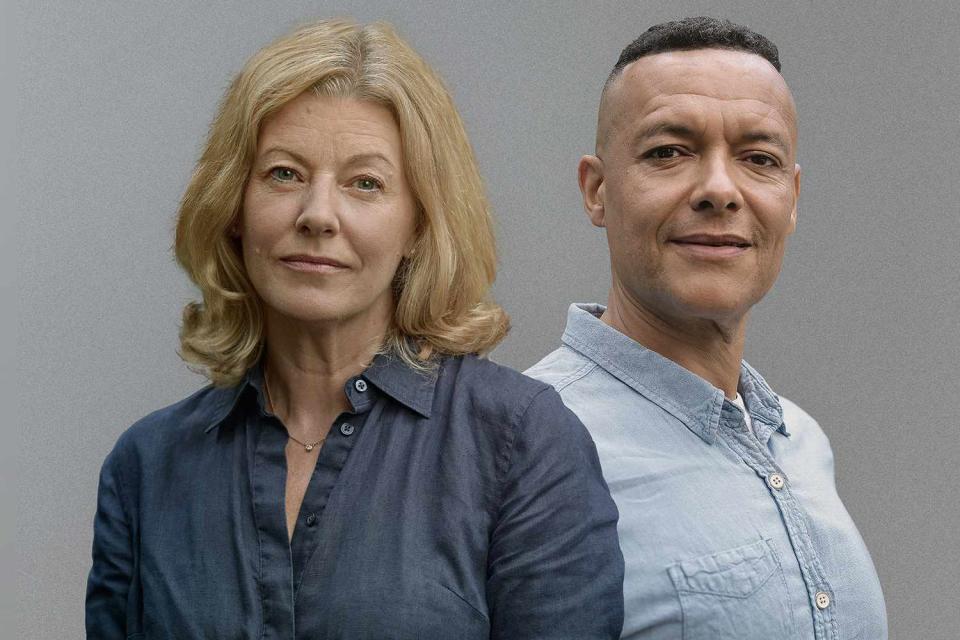
Bill Wadman/Tom Trevatt
Broadcaster and reparations campaigner Laura Trevelyan and British lawmaker Clive Lewis,Former BBC journalist Laura Trevelyan, who quit her job to join the Caribbean's fight for reparatory justice after learning of her ancestors' role in the slave trade, is starting a new journey.
Trevelyan, whose ancestors owned more than 1,000 slaves in the Caribbean island of Grenada in the 18th and 19th centuries, has formed a poignant partnership with a descendant of slaves — fellow Briton and serving British lawmaker Clive Lewis.
The pair recently traveled together to Grenada, where their ancestors of slave owners and the enslaved forged a terrible history. Now they’re telling the story of their families and the ongoing campaign for reparations in a new podcast, Heirs of Enslavement.
Trevelyan recently learned of her family's painful past, including the fact that when slavery was abolished in Britain in 1833, her forebears were compensated with the equivalent of $3.6 million in today’s money. Trevelyan and her family have since been working towards making amends for their ancestors' involvement in the slave trade. In February, she and others made a public apology in front of Grenada’s Prime Minister and she gave $127,000 in reparations to education projects on the island.
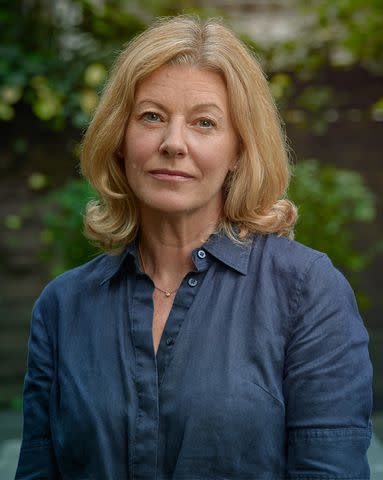
Bill Wadman
Laura Trevelyan at her home in Brooklyn, New YorkFor Lewis, his ancestors were slaves in Grenada, which means that his relatives were very possibly slaves of the Trevelyan family.
Since Trevelyan has advocated for reparations in the Caribbean, Lewis — a Member of Parliament for the opposition Labour Party — has also raised the issue of official reparations.
Related: King Charles Expresses 'Greatest Sorrow' and 'Deepest Regret' Over Past 'Wrongdoings' in Kenya
In the first episode of their podcast, Trevelyan and Lewis visit Beausejour — an old plantation house that was once owned by the Trevelyans.
“You, a descendant of the enslaved in Grenada, me a descendant of enslavers," Trevelyan observes. "And we’re here to try and ask what it means. What does it mean for the present, the future, trying to unpack the past? It feels really profound to me and important.”
Lewis says, “This is obviously part of me. And yet, I’m back in the U.K. talking about these issues as a British politician. So for me, it now feels that the circle is closed, and the two sides of myself, my personal Grenadian side, and my British political side have come together. And that’s quite rare in politics.”
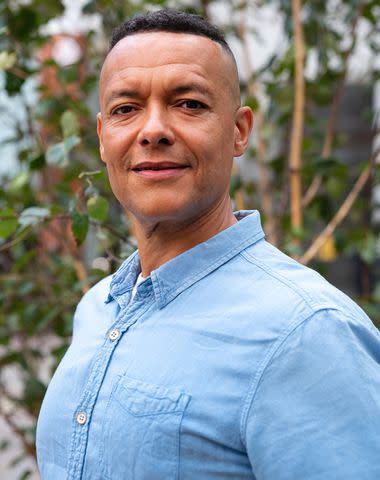
Tom Trevatt
British lawmaker Clive LewisWhen Lewis raised the issue of reparative justice in Parliament, Nicole Phillip-Dowe, a historian in Grenada from the University of the West Indies, leaped with joy. It “made me jump up and down even more that, here we have a Grenadian advocate for this. And it’s not just only going to be listened to by Grenada, but by the rest of the region,” she tells them.
Lewis adds, "There’s so much more to come, it’s only just begun. But what I will say is that there definitely felt an opportunity when Laura’s family stepped up, it felt as if things had come, I wanted to speak about this for quite a while. But the response of so many people in the U.K. and it’s still there, it’s changing, but it’s still there. There is a sense of shame, of guilt."
Last month, Trevelyan called on King Charles, 75, who has supported an investigation into the royal family's ties to slavery, to follow suit and apologize for the royal family's involvement in the slave trade — and pay reparations.
“I would hope very much that in the coming years, he can apologize for the royal family’s historic links to slavery and make a meaningful financial gesture that would be seen as reparative,” Trevelyan tells PEOPLE. “But what that figure is, I have no idea.”
During a visit to the Bahamas in 2021, Charles expressed his anguish over the crimes of the past, referring to the "appalling atrocity of slavery, which forever stains our history." And during a trip to Kigali, Rwanda, last year, he said in a speech, "I cannot describe the depths of my personal sorrow at the suffering of so many, as I continue to deepen my own understanding of slavery's enduring impact. Many of those wrongs belong to an earlier age with different – and, in some ways lesser – values. By working together, we are building a new and enduring friendship."
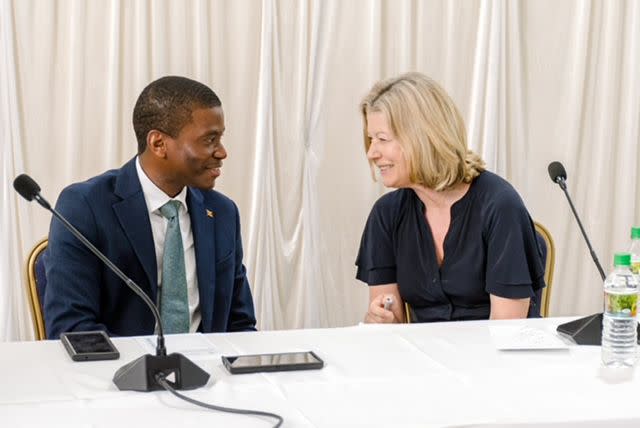
Reynaldo Bernard
Laura Trevelyan with Prime Minister of Grenada Dickon Mitchell when she made an apology along with members of her family in FebruaryPhillip-Dowe advised Trevelyan on how she might go about taking forward her bid to make reparations. The historian explains on the podcast, “Reparations should be seen in two parts. One, recognizing that a crime was committed against people who were enslaved, and two, finding ways of repairing the damage. It brings both sides of the divide to the table . . . getting an opportunity to come to the table and say, ‘Okay, how do we move forward from this? How do we make reparations something that is going to benefit the next generation?’”
Trevelyan says, “It’s a horrible history to have. But if that horrible history, at this moment, can be a catalyst for discussion, then that seems to me like a good thing.”
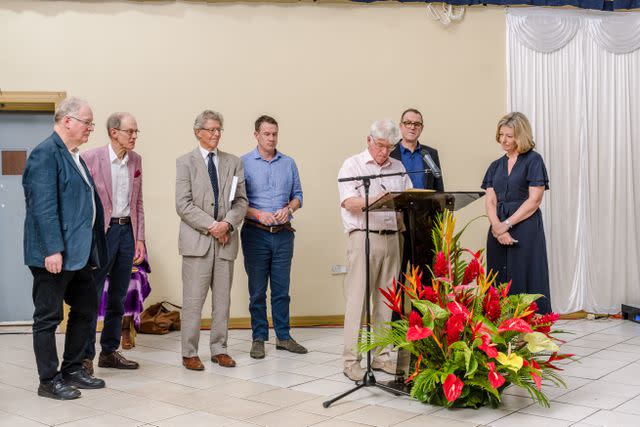
Reynaldo Bernard
Laura Trevelyan, far right, with members of her family signing their letter of apology in GrenadaLewis believes that the U.K. will gain a lot by paying reparations. "I think this will help the United Kingdom find its own feet, to find its place in the 21st century. It needs to do this. It’s cathartic. And so I see this as something of a mission really, for both countries.”
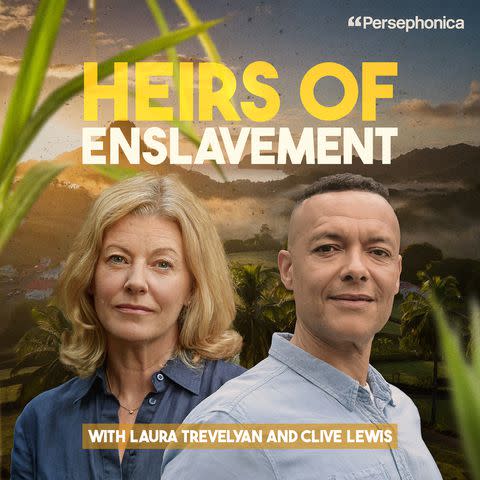
Persephonica
The promo for the podcast Heirs of EnslavemenetIn early November, Trevelyan and her colleagues from Heirs of Slavery (an organization that unites other families that are looking to do their part in the reparations campaign) hosted a private conference in London for families that have ties to slavery who have contacted them in recent months since her story became public. More than 125 families have been in touch from countries like the U.K., Australia, New Zealand and the U.S. in recent months. (There is also an organization called Coming to the Table in the U.S. that encourages descendants of slave owners to sit down with descendants of slaves.)
“What I've learned is it’s the acknowledgment that's important. People have said this to me in the Caribbean, ‘It's not the money you gave Laura, it's the support you're giving to our cause that means so much more,’” she told PEOPLE.
For more People news, make sure to sign up for our newsletter!
Read the original article on People.

